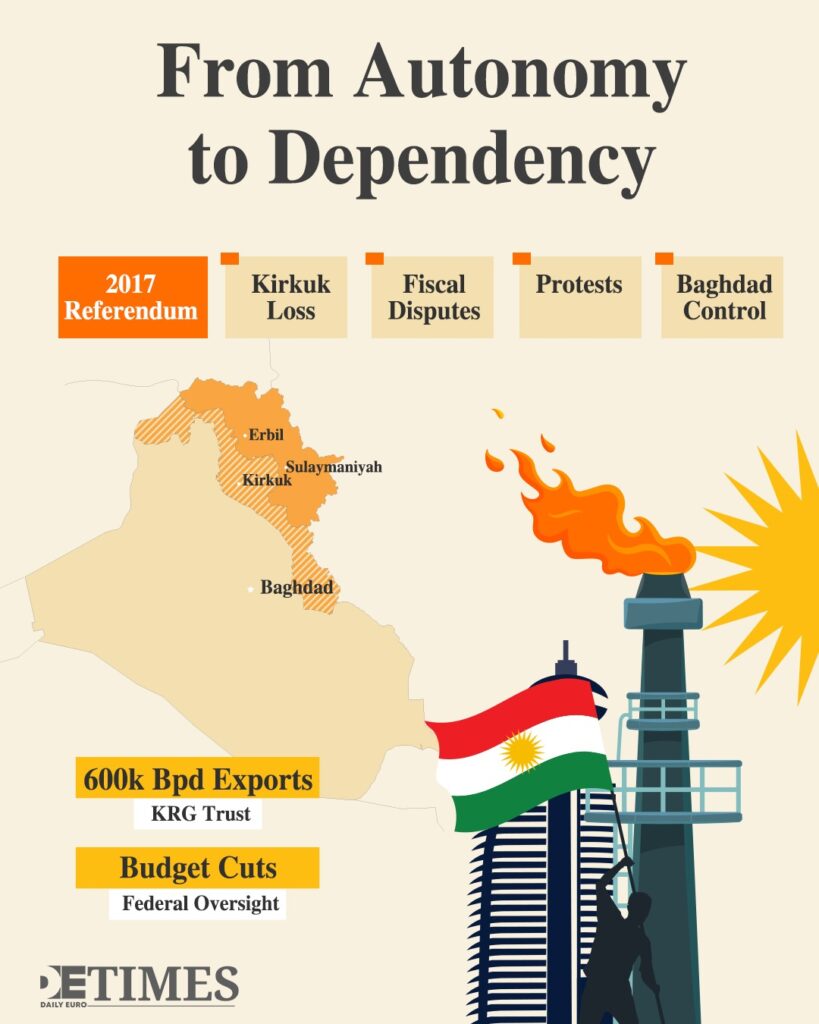Iraqi Kurdistan, once a symbol of autonomy and stability in post-war Iraq, is now facing new challenges threatening its political and economic sustainability. Following the 2017 independence referendum, which led to Baghdad’s military intervention and the loss of control over Kirkuk, the region has found itself in a difficult situation.
The Iraqi central government has in-turn tightened its grip, which has impacted Kurdistan’s domestic politics.
Internal Splits in the Ruling Party
Internal splits within the ruling Kurdistan Democratic Party (KDP) have exacerbated the situation.
Conflicts between various party factions have led to political instability and weakened governance in the region. In doing so, factionalism is promoting corruption and the deterioration of public administration.
Rivalries between party leaders often result in stalled decision-making and inconsistent policies, which undermines public trust. These divisions have also limited the party’s ability to respond effectively to economic and social challenges.
Observers note that without reconciliation and stronger internal cohesion, political fragmentation could further destabilise Iraq and any meaningful concessions for the Kurds.
Corruption and the Economic Crisis
Corruption has become one of the main problems in Iraqi Kurdistan.
Inefficient distribution of oil revenues, a lack of transparency in public spending, and abuses of power have led to an economic crisis. Many citizens are expressing dissatisfaction with government ineffectiveness and demanding reform.
The misuse of public funds has also undermined essential services such as healthcare and education, further fueling public frustration. Small businesses and entrepreneurs face bureaucratic hurdles and favoritism, limiting economic growth and innovation.

Protests and Social Discontent
Protests have become a regular occurrence in Iraqi Kurdistan. Citizens take to the streets demanding improved living conditions, an end to corruption, and political reform.
However, the government’s response is often harsh, raising concerns about democratic processes in the region. Demonstrations are increasingly met with security crackdowns and restrictions on freedom of assembly, which only heightens public frustration.
Social media has become a critical platform for organizing protests and voicing grievances, but online activism is also closely monitored and censored. Analysts note that if authorities fail to address the root causes of discontent, unrest could escalate, threatening both political stability and social cohesion in the region.
Baghdad’s Strengthening Control
In response to internal challenges, Baghdad is strengthening its control over Iraqi Kurdistan.
The central government is taking steps to consolidate its authority, which is limiting the region’s autonomy. This is causing concern among the Kurdish population, who fear the loss of rights and freedoms gained over years of autonomy.
Iraqi Kurdistan finds itself in a difficult situation, where internal political problems and external pressure from Baghdad threaten its stability. Addressing these issues requires a comprehensive approach that includes political reform, fighting corruption, and restoring public trust in the authorities.
Read the Latest Articles on DET!
Airbus’ Edge on Boeing is Innovation, Not Government Support
America First? TikTok Gives Control to Israeli Tech Company
Oktoberfest: A Festival Without the Fest-ivities





